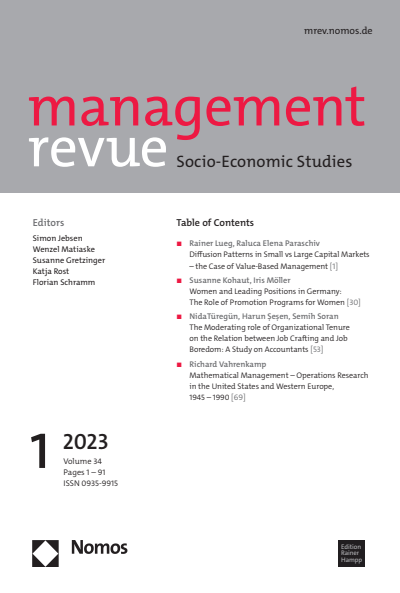Consulting in Context: Legitimacy of Management Consultants in Public Administration and at Universities
IF 1.7
0 MANAGEMENT
引用次数: 0
Abstract
Management consulting has spread to almost all institutional fields. While scholars have largely acknowledged consultants’ role in implementing and legitimising decisions (i.e., legitimation by consultants), less is known about how consultants themselves gain legitimacy (i.e., legitimation of consultants). New institutionalism suggests that legitimacy building refers to the broader institutional context in which consulting takes place and will therefore unfold differently in different fields. By following this reasoning and integrating the institutional work concept, we argue that active clients play an important role in legitimacy-building processes vis-à-vis external consultants. We use data from semi-structured interviews with 38 clients and 41 consultants in two fields beyond the traditional consulting business: public administration and universities. Our analysis shows that in both fields, management consultants source their legitimacy from a broad range of institutional values and processes. In public administration, they have to adapt to a bureaucratic organisation and hierarchy, which gives rise to field-specific interpretative patterns. At universities, consultants do not only have to account for the managerial and administrative thinking of universities’ administrations but also for academic perspectives and traditions in the organization. In both institutional fields, clients who are active in consulting processes co-construct consultants’ legitimacy. However, the role they take as consultants’ partners contrasts between the fields. This is indicated by differences in the way how the failure of a consulting project and its consequences for clients is perceived.背景下的咨询:公共管理和大学管理顾问的合法性
管理咨询已经扩展到几乎所有的机构领域。虽然学者们在很大程度上承认顾问在实施决策和使决策合法化(即顾问的合法化)方面的作用,但对顾问自己如何获得合法性(即顾问的合法化)知之甚少。新制度主义认为,合法性建设指的是咨询发生的更广泛的制度背景,因此在不同的领域将以不同的方式展开。通过遵循这一推理并整合机构工作概念,我们认为,对于-à-vis外部顾问,活跃客户在合法性建设过程中发挥着重要作用。我们使用的数据来自对38位客户和41位咨询师的半结构化访谈,这些咨询师来自传统咨询业务之外的两个领域:公共管理和大学。我们的分析表明,在这两个领域,管理顾问的合法性来源于广泛的制度价值观和流程。在公共行政方面,他们必须适应官僚组织和等级制度,这就产生了具体领域的解释模式。在大学,顾问不仅要考虑大学管理部门的管理和行政思想,还要考虑组织中的学术观点和传统。在这两个机构领域,积极参与咨询过程的客户共同构建了顾问的合法性。然而,他们作为咨询顾问的合作伙伴所扮演的角色在两个领域之间存在差异。咨询项目的失败及其对客户的影响的感知方式的差异表明了这一点。
本文章由计算机程序翻译,如有差异,请以英文原文为准。
求助全文
约1分钟内获得全文
求助全文
来源期刊

Management Revue
MANAGEMENT-
CiteScore
1.20
自引率
0.00%
发文量
7
期刊介绍:
Management Revue - Socio-Economic Studies is an interdisciplinary European journal that undergoes peer review. It publishes qualitative and quantitative work, along with purely theoretical papers, contributing to the study of management, organization, and industrial relations. The journal welcomes contributions from various disciplines, including business and public administration, organizational behavior, economics, sociology, and psychology. Regular features include reviews of books relevant to management and organization studies.
Special issues provide a unique perspective on specific research fields. Organized by selected guest editors, each special issue includes at least two overview articles from leaders in the field, along with at least three new empirical papers and up to ten book reviews related to the topic.
The journal aims to offer in-depth insights into selected research topics, presenting potentially controversial perspectives, new theoretical insights, valuable empirical analysis, and brief reviews of key publications. Its objective is to establish Management Revue - Socio-Economic Studies as a top-quality symposium journal for the international academic community.
 求助内容:
求助内容: 应助结果提醒方式:
应助结果提醒方式:


